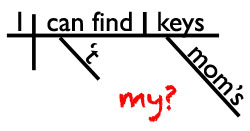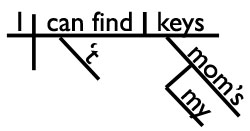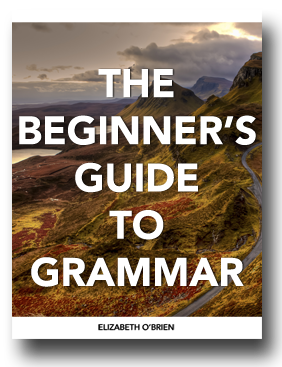Join the Smart Punctuation Challenge! We start February 23.
Possessive Nouns Can Do Something Strange
Possessive Nouns Can Do Something Strange
- Home
- Parts of Speech
- Nouns
- Possessive Nouns
Did you know that possessive pronouns can do something strange? It's true! An English teacher named Elyse summed up the problem well in an email to me. Let's read her email and figure out what's going on. Here we go!
Elizabeth,
I’ve come across this situation a few times, and I can’t find an explanation.
I can't find my mom's keys.
What is “my?" It seems to be an adjective modifying another adjective ("mom's"), but since that’s not possible, is there another term for it? Or would we consider “my mom's” some sort of compound adjective modifying the noun “keys” and leave it at that? I’m intrigued, and any help is appreciated!
Best,
Elyse, English Teacher
That's a great question! Before we dive deeper into Elyse's question, let's have a quick review of what nouns and adjectives are.
Quick Refresher
- Nouns name people, places, things, or ideas. (teacher, park, pencil, liberty)
- Adjectives modify nouns and pronouns. (happy teacher, fun park, yellow pencil)
What are possessive nouns?
Nouns have what are called cases. The case of a noun tells us more about what the noun is doing in the sentence. In English, the main noun cases are nominative, objective, and possessive.
- Nouns in the nominative case perform one of the noun jobs below. They can be modified by adjectives.
1. Subjects (Cats meow.)
2. Predicate Nouns (It is a cat.)
3. Nouns of Direct Address (Cats, where are you?)
4. Appositives to any of the above jobs (Marshall, the cat, meowed.) - Nouns in the objective case perform one of the noun jobs below. They can be modified by adjectives.
1. Direct Object (I like cats.)
2. Indirect Object (I gave the cat a treat.)
3. Objective Complement (I named my cat Marshall.)
4. Object of a Preposition (Give it to the cat.)
5. Adverbial Noun (Walk a mile with the cat.)
6. Appositives to any of the above jobs (I like my cat Marshall.) - Nouns in the possessive case show ownership/possession. They don't perform any of the noun jobs! So, what in the world do they do? Let's find out!
Mom's keys, lady's books, building's doorbell
The keys belong to Mom, the books belong to the lady, and the doorbell belongs to the building. These are all showing possession. Let's look more closely at one of those examples and see it in a sentence.
I can't find Mom's keys.
Mom's is a possessive noun. It's telling us whose keys we're talking about.
What job is Mom's performing in this sentence? It's functioning as an adjective modifying the noun keys. Isn't that strange? It's not functioning as a noun. It's functioning as an adjective!
Possessive nouns function as adjectives.
We even diagram these nouns as adjectives. (That means they go under the noun that they are modifying.)

I can't find Mom's keys!
Now we know what job possessive nouns perform. (Do you remember what they do? I hope you easily remembered that they perform the job of an adjective.)
However, there's something we need to consider: adjectives modify nouns. They don't modify adjectives. That means that we would not have an adjective modifying another adjective.
Hmm...so can possessive nouns be modified by adjectives? Let's see.
The Strange Thing
Check out the sentence below and focus on the word my.
I can't find my mom's* keys!
* Psst! Did you notice that in this sentence, mom's starts with a lowercase m? You can learn about this with capitalization rule #1A.
What is my modifying? Where should we put it in the sentence diagram?

My is a possessive pronoun, which functions as an adjective, but it doesn't seem to be modifying the noun keys. After all, they are not my keys, they are my mom's keys.
My seems to be modifying mom's, and mom's is functioning as an adjective. But wait! Adjectives don't modify other adjectives! What is going on here?
The trick is that possessive nouns can be modified by adjectives.
Even though they function as adjectives, they maintain some of their "noun-ness" and can still be modified by adjectives, just like nouns in the nominative and objective cases.
Diagram my on a slanted line under mom's.

I can't find my mom's keys.
Normally, we would only diagram an adverb underneath an adjective since adjectives are modified by adverbs. Because of that, you might need to look twice at this setup to remember that my is actually an adjective modifying a possessive noun...which is functioning as an adjective!
Summary
Did you find that helpful? I hope that it all made sense! Let's review what we covered on this page.
- Nouns name people, places, things, and ideas.
- Adjectives modify nouns. They don't modify other adjectives.
- Nouns in English can be used in three cases: nominative, objective, and possessive.
- Nouns in the nominative case and the objective case perform one of the noun jobs. They can be modified by adjectives.
- Possessive nouns don't perform any of the noun jobs! Possessive nouns function as adjectives.
- Possessive nouns maintain some of their "noun-ness" even though they function as adjectives. Their "noun-ness" makes them able to be modified by adjectives.
This is original content from https://www.english-grammar-revolution.com/possessive-nouns.html
If you'd like to teach or learn grammar the easy way—with sentence diagrams—check out our Get Smart Grammar Program.
It starts from the very beginning and teaches you grammar and sentence diagramming in easy, bite-size lessons.

Hello! I'm Elizabeth O'Brien, and my goal is to get you jazzed about grammar.
Like many, I adore your program. I have a BA in English, an MA in Psychology, and am a certified TEFL instructor. Yet NONE of those marvelous programs taught me grammar!
Thank you, Elizabeth. THANK YOU, THANK YOU, THANK YOU. (You're a rock star!)
My students, by the way, also adore your program!
- Michelle, Adult ESL Teacher
Our Free Guide Gives You A Fun Way
To Teach And Learn The Basics v

Elizabeth O'Brien is the creator of Grammar Revolution.
Her lessons are guaranteed to give you more confidence in your communication skills and make you smile. :)

